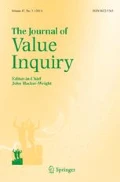Notes
For the latter approach, see Eric Olson, “The Epicurean View of Death,” Journal of Ethics, Vol. 17, (2013), 65–78.
See Stephan Blatti, “Death’s Distinctive Harm,” Amerian Philosophical Quarterly, Vol. 49, (2012), pp. 317–330.
Some of the typical views on the timing question are that death harms us prior to death, at the moment of death, after death, at all times, or at an indefinite time.
Blatti, op. cit., p. 318.
This is not to claim my endorsement of priorism, but only that I will grant it for the sake of argument. For some notable objections to priorism, see Ben Bradley, Well-Being and Death (Oxford: Oxford University Press, 2009), pp. 87–88 and Jens Johansson, “The Time of Death’s Badness,” Journal of Medicine and Philosophy, Vol. 37, (2012), pp. 464–479.
For a few examples of prominent defenders of the deprivationist view, see John Martin Fischer and Anthony Brueckner, “Why is Death Bad?”, Philosophical Studies, Vol. 50, (1986), pp. 213–223; Jeff McMahan, The Ethics of Killing (Oxford: Oxford University Press, 2002); Steven Luper, “Mortal Harm,” Philosophical Quarterly, Vol. 57, (2007), pp. 239–251; and Bradley, op. cit.
Of course all real changes are Cambridge changes, but not all Cambridge changes are real changes. See Peter Geach, God and Soul (London: Routledge & Kegan Paul, 1969).
Blatti, op. cit., p. 320.
Ibid.
See Thomas Nagel, Mortal Questions (Cambridge: Cambridge University Press, 1979) and John Martin Fischer, Our Stories: Essays on Life, Death, and Free Will (Oxford: Oxford University Press, 2009).
Blatti, op. cit., p. 320.
Ibid., p. 323.
Ibid., p. 324.
Ibid.
Ibid., p. 325.
Ibid.
Ibid., p. 324
Ibid., p. 322.
An anonymous reviewer correctly notes that certain accounts of harm (such as those found in Bradley, op. cit., 2009 and Travis Timmerman, “Your Death Might be the Worst Thing Ever to Happen to You (But Maybe You Shouldn’t Care,” Canadian Journal of Philosophy Vol. 46, (2016), pp. 18–37) would construe the chef’s actions as a harm, whereas other accounts (such as the one found in Molly Gardner, “On the Strength of the Reason Against Harming,” Journal of Moral Philosophy, Vol. 14, (2017), pp. 73–87) would not. I thank the reviewer for this point.
An anonymous reviewer suggests that Blatti might instead appeal to the following principle:
[L*]If x is intrinsically valuable and typically consistently present throughout one’s life, then any possible limitation of x is intrinsically harmful.
Although [L*] avoids the objection to [L], there might be similar counterexamples raised against [L*]. That said, I do not want to foist [L] (or [L*]) as a key assumption in Blatti’s case, only that he has not done enough to explain why possible limitations should be regarded as intrinsically harmful.
Blatti, op. cit., pp. 323–324.
Ibid., p. 324.
Ibid., p. 325.
An anonymous reviewer proposes a case in which someone is contingently immortal (but eventually dies). Under the ontological interpretation, death would not restriction-harm that individual (since it is not a matter of necessity). Moreover, the death of a regular mortal would not be worse than the death of a contingently immortal person (even though the latter is not being restriction harmed), which seems to be the wrong result. Hence, we have additional reason to reject the ontological interpretation. I thank the reviewer for this point.
An anonymous reviewer notes that Blatti could maintain that a young person’s death is worse than the death of an old person since Blatti’s view includes both deprivation harm and restriction harm, and hence it is worse in virtue of the deprivation harm. But the more Blatti relies on the deprivation harm, the more he weakens his case that DRV is to be preferred over DV. Moreover, given the first point stated in footnote 27, there is a strange mix of deprivation and restriction harms—dying early would increase deprivation harm but decrease restriction harm whereas dying very late would decrease deprivation harm but increase restriction harm.
Olson argues for such an entailment in Olson, op. cit., p. 69.
Additionally, under DRV, it might even be worse to live longer since there is more time for one’s autonomy to be possibly limited and hence more time to accrue additional harm. I thank Neal Tognazzini for this point. Furthermore, if one merely believes they will not die, then under the epistemological interpretation, one can prevent from being restriction harmed, which seems implausible. I thank an anonymous reviewer for this point.
It might be suggested that Blatti is not conflating these two interpretations but is perhaps proposing that both types of harm are included in the harm of death. This suggestion doesn’t fit well with the way Blatti presents it. But even if it is what he intended, such a view remains problematic since both interpretations have their own problems (and hence this combination view incurs both set of problems).
Many thanks to John Martin Fischer, Andrew Bailey, Taylor Cyr, Jason Gray, Benjamin Mithcell-Yellin, Duncan Purves, Alex Rajczi, Travis Timmerman, Neal Tognazzini, an anonymous reviewer, and those who attended my presentations of an earlier draft at the 2016 American Philosophical Association Pacific Meeting and the 2015 SoCal Philosophy Conference at San Diego State University. This paper was completed through the financial support (and helpful comments of fellow participants) from the Immortality Project’s Younger Scholars Workshop at the University of California, Riverside.
Author information
Authors and Affiliations
Corresponding author
Rights and permissions
About this article
Cite this article
Yang, E. Does Death Restriction-Harm Us?. J Value Inquiry 52, 429–436 (2018). https://doi.org/10.1007/s10790-017-9624-7
Published:
Issue Date:
DOI: https://doi.org/10.1007/s10790-017-9624-7

